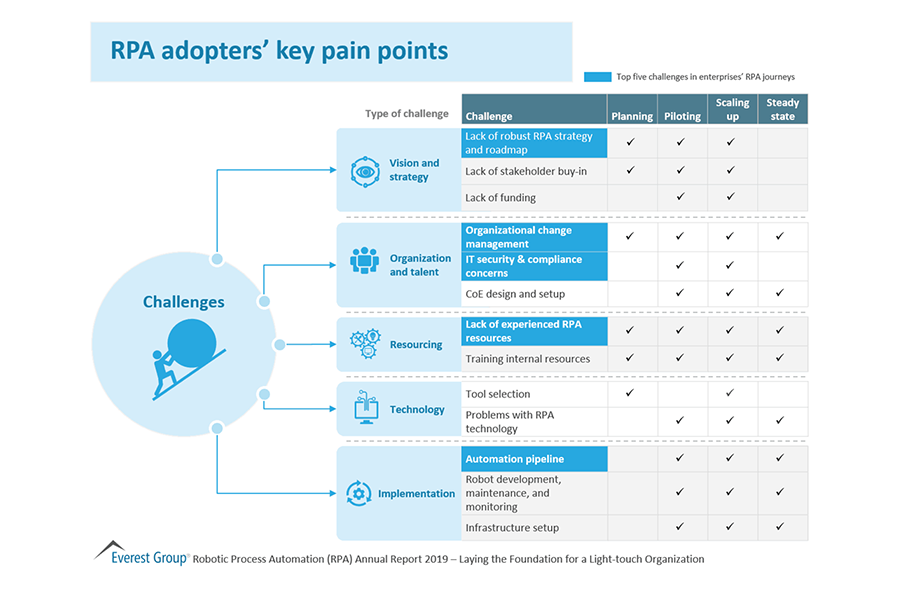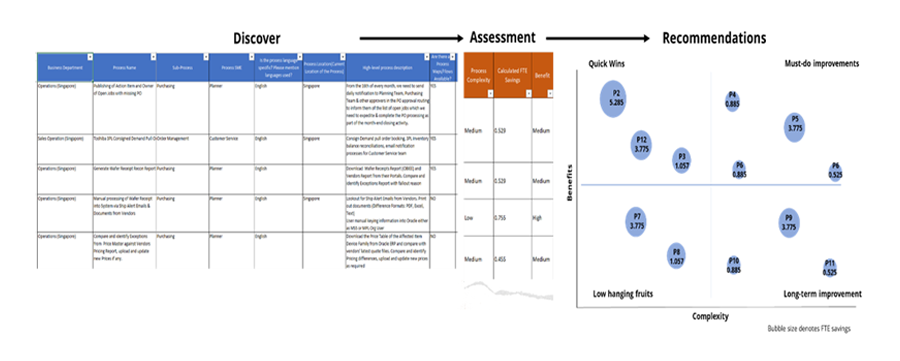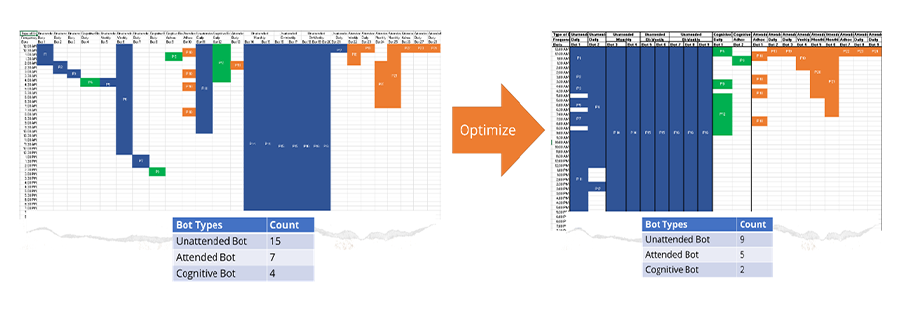Enterprises are embarking on their RPA journey. Countless surveys suggest that the adoption of RPA+AI+ML has delivered higher productivity, accuracy, and compliances. However, a set of surveys was published recently, that also discusses the challenges that most organizations face in launching or running RPA programs resulting in the unrealized value of RPA.
Some of the more glaring common challenges in launching RPA programs or to running them effectively are:
-
Selection of right processes to automate
-
Processes not standardized or following best practices
-
Selection of the right technology
-
Lacking the right skill to implement AI
-
Creating cases and getting stakeholder buy-in
-
Rolling out change management
Jade’s Intelligent Automation Service line offers advisory services as one of the offerings that help customers overcome major challenges in implementation, maintenance, and launching RPA programs. RPA Annual Report by the Everest Group depicts the key challenges that enterprises face during the RPA lifecycle followed by how Jade Global’s advisory services help overcome these challenges:

Selecting the Right Process for the exercise needs adequate investigation before implementation. Jade Global has defined a Standard Process Assessment Framework, to identify correct processes. In this Framework, 3 phases are defined:
Process Discovery
-
In this Phase, all eligible processes are identified
-
Process inputs are captured, and risk evolution is done
Process Assessment
-
Processes are evaluated using the Jade Assessment standard checklist
-
Based on the above, process complexity, possible exception, transaction volumes are determined
Process Recommendation
-
Based on the First 2 steps Process Return of Investment (ROI) is calculated, and a process roadmap is created
-
Quadrant analysis is also done for process recommendation for automation.


Over the years, manual processes get overburdened with many sub-paths or exception routes as per the convenience of the human workforce resulting in non-standardized manual processes. Automating a non-Standardized process results in increased error rate, high maintenance costs, less reliable results, less predictable output, very less saving, etc, and achieving efficiencies and ROI become an unrealizable goal.
Jade Global’s 18+ years of industry expertise across various verticals understands the process, scope, purpose, and outlines recommendations for process standardization. Jade functional experts engage with customers’ key stakeholders to deliberate on the as-is process and standardization possibilities for automation.
We outline:
-
Complete documentation of the existing non-standardized process to identify manual, semi-automated & automated activities within the process
-
Process mining, task mining, etc to explore the entire process
-
Strategy for a standard business rule library that can be used by the automation process
-
A standard mechanism, guidelines for the maintenance of the business rule library
-
Identify standard working procedures which can be introduced and mapped to the process map
-
Identify the complexity of the process and investigate ways of reducing it by applying standardization
Choosing the right technology calls for a strategic and enterprise-level view. Technology selections consider existing processes, organization goals, and security policy with the following technical key points:
-
Ease of Use- Ease of use is one of the fundamental characteristics of any technology. As the Intelligent Automation solution is being deployed for accelerating the processes of business, it should be simple enough to be understood and used by employees.
-
Interface Design- A clear, user-friendly, and workable interface that allows for easy functionality and allows users to easily perform activities without any major learning process.
-
Scalability- Ability to effectively adapt to the operational demands of a business. It should allow to scale up/down operations as per requirements. It should be adjusted to operating systems, browsers, devices to scale up production in a healthy way.
-
Technology Integration- An effective Intelligent Automation solution needs to integrate with different systems and technologies. This is the essential capability of any digital workforce. When the solution has strong integration capabilities it can result in more healthy, quicker, and more effective automation.
-
Support and Professional Services- A strong support organization can minimize delays in deployment and strengthen maintenance procedures. Ideally, the technology should come with a broad choice of training options, including computer-based training, classroom, and online tutorials.
Jade Global is a technology agnostic player with expertise in all major RPA technologies. Jade leverages its wide expertise to help enterprises choose the right technology – be it UiPath, Automation Anywhere, Blue Prism, etc. with cognitive machine learning and AI capabilities.
With its strong practice in RPA as well as a focused learning and development department, Jade designs tailored training and learning programs driven by training the trainer practice.
Jade’s well-defined robust framework with re-usable assets/accelerators takes away the need for deep training of each resource – and enables a factory development model.
The success of an Automation program depends on how change is managed at the organizational level that comes along with it. Stakeholder alignment, defining SoPs, user training, assessing the effectiveness of change, etc are key practices followed to ensure the success of change across the enterprise.
Jade’s Managed Robot Operation (MRO) is primarily designed to deliver L1 and L2 services for RPA/BOTs that are already deployed in production. But before getting into such engagement, we leverage our advisory services to:
-
Assess the current level of KPIs being measured to gauge the effectiveness of deployed RPA processes, an opportunity for continuous improvement, etc. Based on findings, the Jade advisory service establishes key missing KPIs (if any) under 3 major categories – Technical infra effectiveness/efficiencies, Process coverage/adoption rate, and workforce optimization achievement.
-
Evaluate at all processes deployed in production vs the number of RPA BOTs hosting those processes. Jade’s proprietary tool is used to assess the capacity of each BOT utilized and processes are adjusted for optimal utilization of BOT. As a result, it may help free up precious BOT licenses that can be used for upcoming processes.

Governments and enterprises are adopting RPA and AI to improve efficiencies in their operations. RPA is transforming businesses around the world, but your business might be running in circles to develop a successful RPA program. As the number of business processes requiring automation is increasing globally, the demand for RPA and AI professionals is also rising. Jade Global delivers many projects globally through its Intelligent Automation Advisory Services line with technology experts, business experts, and specialization service lines. Jade Global’s IT consulting services helps optimize automation capabilities for all types of enterprise including, hi-tech, life sciences, automotive companies, hospitality, manufacturing industries in addition to key global brands.













